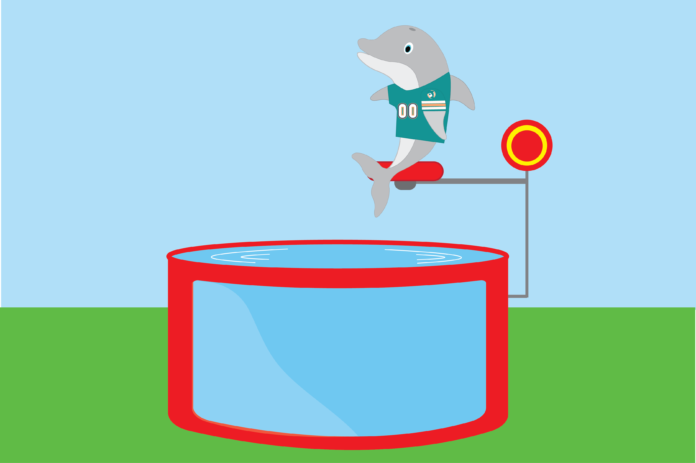In order to win in today’s NFL you must lose first.
The Miami Dolphins have not won a playoff game in almost 19 years. They’ve lost each of their first seven games by an average margin of 24.7 points. Their roster is $26.2 million less expensive than the next lowest spending team. They are in full-on tank mode and the league will not admit it. It’s a win-now league, but not all teams can win right now. Some teams have to go through years of losing first. This is moneyball in the NFL.
Tanking is a phenomenon by which teams can supposedly gain a long-term competitive advantage by intentionally losing as much as possible for a limited amount of time. Losing so much and selling all viable players for picks means teams can accumulate as much draft capital as possible. Tanking is not so much intentionally throwing individual games as it is setting up the infrastructure to lose as many games as possible.
Tanking is committing fully to a rebuild and then some.
Tanking has proven effective in the MLB with both the Cubs and Astros committing to the tank for years, and now both have won championships as a result. In the NBA, the Sixers were the poster child for tanking, urging fans to “trust the process” as the team accumulated seven first-round picks in four years. They are now a top-five favorite to win the NBA title this year because of it.
The closest the NFL has ever been to tanking is the decades-long abysmal performance by the Cleveland Browns. The Browns went 1-31 in two consecutive seasons from 2015 to 2017 before finally turning it around — their last stint of losing before drafting Myles Garrett and Baker Mayfield. Those two starting pieces on either side of the ball allowed the Browns to trade for players like Jarvis Landry, Odell Beckham Jr. and Olivier Vernon and move into position to win the AFC North.
The Dolphins check all the boxes for what it means to be a tanking team. They are currently winless on the season. They have traded away their two most valuable assets –– Laremy Tunsil and Minkah Fitzpatrick –– to collect draft capital. And they have stripped their roster down to cheap, short-team players full on rookie contracts and fun veterans.
It’s textbook and it’s beautiful to see.
What is the point of aiming to win but being a mediocre team for decades when you can just actively lose for two to three seasons and accumulate young, cheap talent through the draft, setting your team up with a multi-year championship window? The Dolphins owner Stephen Ross seems to agree with this tactic.
If you’re the Dolphins and you’ve had two decades of the New England Patriots consistently dominating your division, why would you not tank and play the long game to outlast Belichick and Brady?
The Dolphins tanking is good for the NFL. The same teams have been dominating the league for decades. Seeing the Patriots in the Super Bowl year after year is impressive, but excruciatingly repetitive and boring.
The Dolphins and the Browns leading the league would do wonders for the Miami and Cleveland markets as well as diversify the NFL as a whole. Tanking gives fans more reasons to root for teams and be invested in the long run. It also gives young players time to gain experience that would otherwise be unavailable to them.
The concept of winning is deeply ingrained in what we do. But winning is overrated. Winning is treated as though it is everything, but it really isn’t.
Is anything in life really as black and white as winning or losing? On a day-to-day basis, life is all about grey areas and hopefully setting up long-term success.
The league is becoming increasingly divided as the winners keep winning and the losers keep losing. Part of that is because those teams are not good at evaluating talent and managing their roster and the other part is that good teams have used high draft picks on valuable franchise corner pieces, like quarterbacks, to stay relevant for so long. The only way to change that with the rules that currently apply is to tank.
Written by: Calvin Coffee — cscoffee@ucdavis.edu
Disclaimer: The views and opinions expressed by individual columnists belong to the columnists alone and do not necessarily indicate the views and opinions held by The California Aggie.




